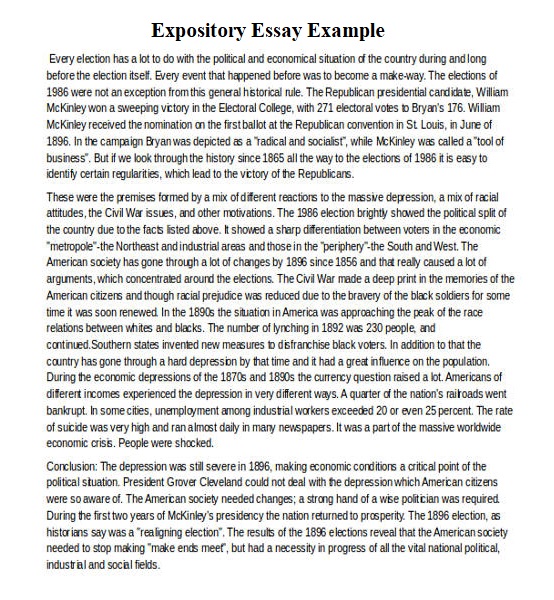Expository essays are a fundamental genre of academic writing that requires students to explore and explain a particular topic or idea clearly and concisely. The primary purpose of an expository essay is to offer a balanced and objective analysis of a subject. Whether you’re a student looking to improve your essay-writing skills or someone interested in understanding this form of writing, this article will guide you through crafting a compelling expository essay. We will cover the structure essential tips, provide ten expository essay examples with excerpts, and offer 25 intriguing expository essay topics to inspire your next piece of writing.

Table of Contents
Structure of an Expository Essay
Introduction
The introduction serves as the gateway to your essay. It should grab the reader’s attention with a hook, provide necessary background information about the topic, and present a clear and concise thesis statement. The thesis statement is crucial as it outlines your essay’s main point.
Body Paragraphs
The essay’s body typically consists of three or more paragraphs; each focused on a specific aspect or subtopic related to your thesis statement. Here’s the basic structure of a body paragraph:
Topic Sentence: This sentence introduces the main idea of the paragraph.
Supporting Evidence: Provide facts, examples, statistics, or quotations to help your topic sentence.
Explanation: Explain how the evidence supports your thesis and the significance of the information presented.
Transition: Use transitional words or phrases to connect one paragraph to the next smoothly.

Conclusion
The conclusion wraps up your essay by restating the thesis statement and summarizing the key points made in the body paragraphs. Avoid introducing new information here. Instead, it provides closure and leaves the reader with something to ponder.
Tips for Writing an Expository Essay
- Choose a Strong Topic: Select a topic that interests you and is suitable for an expository essay. Ensure it’s specific enough to be explored in-depth.
- Research Thoroughly: Gather reliable sources of information to support your essay. Cite your sources correctly.
- Craft a Clear Thesis Statement: Your thesis should be concise and present the main idea of your essay in a single sentence.
- Organize Your Ideas: Create an outline to structure your essay logically. Each paragraph should flow smoothly into the next.
- Be Concise and Clear: Use straightforward language and avoid unnecessary jargon. Ensure your ideas are easily understood.
- Provide Evidence: Support your claims with credible evidence, such as examples, statistics, or expert opinions. Maintain a Neutral Tone: Expository essays are not the place for personal opinions.
- Edit and Proofread: Carefully revise your essay for clarity, grammar, and spelling errors before submission.
- Seek Feedback: Have someone else read your essay to get a fresh perspective and identify any weaknesses.
- Practice Patience: Writing a polished expository essay takes time. Don’t rush through the process; allow for multiple drafts and revisions.
Common examples of expository essays include:
- Explanatory Essays: These essays explain a concept, process, or idea, often breaking it down into smaller components for better understanding.
- Descriptive Essays: Descriptive expository essays provide detailed descriptions of a person, place, object, or event, allowing the reader to visualize and understand it better.
- Compare and Contrast Essays: These essays analyze the similarities and differences between two or more subjects, helping readers gain insights into their relationships.
- Cause and Effect Essays: Cause and effect expository essays explore the reasons behind an event or phenomenon and its consequences.
- Problem-Solution Essays: These essays identify a specific problem and propose solutions or strategies to address it.

10 Expository Essay Examples with Excerpts
Climate Change: The increase in global temperatures results from several factors, including greenhouse gas emissions and deforestation.”
History of the Internet: A revolutionary invention, the Internet has evolved from a military communication tool to a global information hub.
Effects of Social Media: The impact of social media on society ranges from increased connectivity to concerns about privacy and mental health.
The Scientific Method: The scientific method is a systematic approach to investigating natural phenomena involving observation, hypothesis testing, and data analysis.
Renaissance Art: Renaissance art, characterized by its focus on humanism and realism, produced masterpieces like Leonardo da Vinci’s ‘Mona Lisa.’
Space Exploration: Space exploration has led to significant technological advancements and expanded our understanding of the universe.
Influence of Greek Philosophy: Greek philosophy, with philosophers like Socrates and Plato, laid the foundation for modern Western thought.
Impact of Fast Food: The proliferation of fast-food chains has raised concerns about public health, leading to discussions on obesity and nutrition.
The Industrial Revolution: The Industrial Revolution marked a turning point in history, transforming societies through technological innovations and urbanization.”
The Human Brain: The complexity of the human brain, with billions of neurons and intricate networks, remains fascinating for scientists.”
25 Expository Essay Topics
- The Impact of Artificial Intelligence on the Job Market
- The History and Significance of the Bill of Rights
- Exploring the Causes of the Great Depression
- The Influence of Literature on Society
- The Process of Photosynthesis
- The Role of Women in World War II
- The Cultural Significance of Traditional Festivals
- Understanding Quantum Mechanics
- The Effects of Cyberbullying on Adolescents
- The Origins of Classical Music
- The Benefits and Drawbacks of Renewable Energy Sources
- The Art of Persuasion: Rhetorical Devices in Speeches
- The Evolution of Human Rights
- The Impact of Globalization on Local Cultures
- The Biology of Human DNA
- The Role of Mass Media in Shaping Public Opinion
- The Significance of the Silk Road in History
- The Process of Cellular Respiration
- The Influence of Ancient Greek Mythology on Modern Culture
- The Economic Consequences of World War I
- The History of Environmental Conservation Movements
- The Effects of Video Games on Cognitive Development
- The Theory of Evolution by Natural Selection
- The Cultural Significance of Traditional Cuisine
- The Consequences of Deforestation on Biodiversity
Frequently Asked Questions
1. What is an Expository Essay?
An expository essay is a form of academic writing that aims to inform, explain, or describe a specific topic using facts, evidence, and a clear, objective tone without expressing personal opinions or emotions.
2. Elements of an Expository Essay?
An expository essay typically includes an introduction with a thesis statement, body paragraphs presenting evidence and explanations, and a conclusion summarizing key points. It relies on factual evidence, maintains objectivity, and ensures clarity and organization.
3. How to Choose a Topic for an Expository Essay?
Choose a topic that interests you, aligns with assignment guidelines, has sufficient credible sources, and can be narrowed down to a specific aspect or question. Consider the relevance to your audience and avoid overly broad or narrow topics.
Conclusion
Writing an expository essay requires careful planning, research, and a commitment to clarity and objectivity. Following the provided structure tips and drawing inspiration from the examples and topics, you’ll be well-equipped to craft an informative and engaging expository essay that effectively conveys your chosen subject matter to your audience. Remember, practice makes perfect, so don’t be discouraged if your first attempts require revisions; each essay you write will help you improve your skills.
